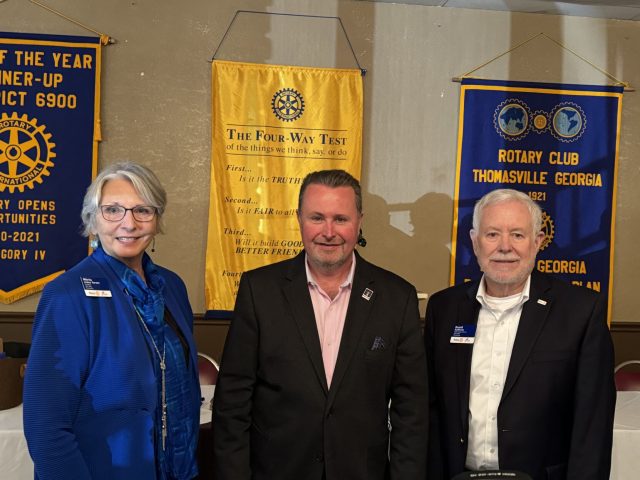Georgia DBHDD Commissioner addresses Rotary Club
Published 10:05 am Wednesday, October 16, 2024

- AN UPDATE ON THE DBHDD: Pictured left to right are Rotary Club President Marta Jones- Turner, DBHDD Commissioner Kevin Tanner, and Rotarian David Sofferin. (Jill Holloway/The Thomasville Times- Enterprise)
THOMASVILLE- Thomasville Rotary Club welcomed Georgia Department of Behavioral Health and Developmental Disabilities Commissioner Kevin Tanner to their meeting this past week, where he addressed some of the challenges the department has faced and how he is working to create lasting change.
Tanner was appointed by Georgia Gov. Brian Kemp in 2022 and currently oversees an operating budget of $1.6 billion and a workforce of 4,500 employees, excluding the numerous contracted employees, such as The Vashti Center and the Georgia Pines Community Service Board.
Tanner explained the DBHDD is a fairly new agency, created in 2009 out of the old DHR state agency.
Trending
“The DHR was a very large state agency that housed DFACS and the Department of Public Health,” Tanner said. “Everything was up under this agency and it just became very burdensome and bureaucratic. It was decided to split that agency up, and out of that came the Georgia Department of Behavioral Health.”
Under his leadership, Tanner has seen a historic transformation in the agency’s workforce, resulting in reopening previously offline crisis beds and enabling state hospitals to operate at nearly full capacity.
Currently, Tanner helps control five state hospitals.
“That number used to be larger, but over the past few decades there’s been a lot of hospital beds shut down,” he said.
Tanner shared he has often asked leaders why the hospitals were closed, as he currently has a capacity issue.
“A lot of it had to do with a settlement agreement with the Department of Justice,” Tanner said.
Trending
Despite this, Tanner has found help with the 22 community service boards across Georgia, 13 behavioral crisis centers, and nine crisis stabilization units.
Tanner’s main issue is forensic beds, which are typically used for people waiting in jail to come to a hospital for restoration services.
“I only have 641 of those in the entire state,” Tanner said. “Half of those are taken up by people who have been in the state hospital on average of 9 years, so I have about 300 beds that turn over every 90 days to six months for restoration services.”
Tanner said he has approximately 800 people currently in jail waiting on a hospital bed.
“We have a capacity issue in this state,” he said. “We have a lot of people in this state providing great services, we just need more of them.”
To help people in instances of crisis, where they are not able to get the services in need, Tanner and the DBHDD created 988, a national number people can access 24/7 for times of crisis or suicidal thoughts.
“People can talk to a live, trained technician completely anonymous, 24 hours a day,” Tanner said. “We get 20,000 calls a month in Georgia.”
Through these calls, 988 can dispatch a mobile crisis center to the caller, meaning the DBHDD can meet an individual where they are with a licensed clinician.
“This is a very valuable service,” Tanner said. “We are building out the network, and it’s going to take time, just like it did with 911. But, this is a game changer for us.”
Tanner encouraged members of the Rotary Club who may have friends in crisis who cannot wait to meet with a clinician to give 988 a ring.
“988 is more than just a person to call on the phone,” he said. “There is a disproportionate number of people calling 988 in rural areas versus metro Atlanta.”
Tanner explained that rural Georgia has fewer resources than Metro Atlanta, and oftentimes people may feel that there is no one to see or talk to about their issues. Rural Georgians may also feel a stigma surrounding getting help, as opposed to those in larger cities, where the conversation is more common.
“There is also a disproportionate number of suicides by farmers both nationally and here in Georgia,” Tanner added. “Our agriculture community has a high suicide rate.”
Tanner understands that being a farmer can cause an insurmountable amount of pressure, especially for those who do everything right but can be easily devastated by natural occurrences such as hurricanes and tornadoes.
“Our farmers are under so much stress,” he said. “That’s one of the reasons we started the Faith and Farms initiative.”
Beyond the issues facing rural Georgians mentally, Tanner has seen a struggle internally at the DBHDD to keep up with the demand for high-paying jobs, following the COVID-19 pandemic, where more than 1,200 nurses left the profession.
“We had to stop the bleeding,” he said. “I can’t serve Georgia if I don’t have the workforce, both internally and externally.”
Following an in-depth study of the DBHDD’s workforce, Tanner learned his agency was approximately 20 percent behind on the pay for the medical staff. He was provided with two pay packages that have tremendously helped the system and gain back 40 percent of the people lost during COVID-19.
“We are recruiting people where they are in the workforce and it’s really making a difference,” he concluded. “For the first time since spring 2020, all of our beds are back online, because we have the staff.”
With new solutions on the horizon for additional beds and staffing, Tanner is looking forward to continuing to serve Georgians far and wide.






